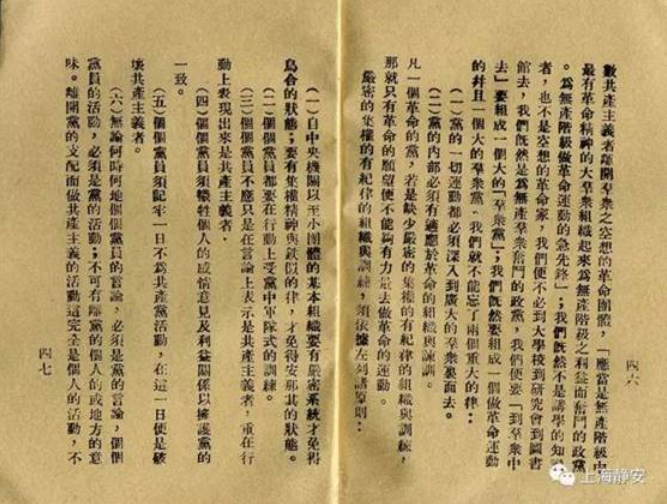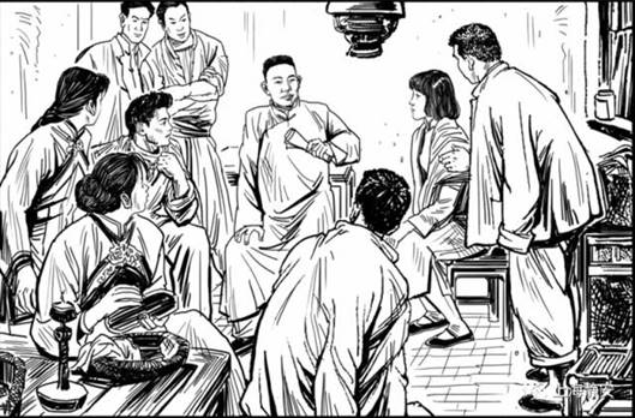In downtown Shanghai, there stand two rows of shikumen buildings with dark gates, shiny door cymbals, mottled walls and beautifully carved lintels. All these form a classic picture that warms the hearts of Shanghai people for hundreds of years, carrying on the legend about the place turning into the cradle of Chinese revolution from an ordinary alley. No. 625 Fudeli, Nanchengdu Road (present-day No. 30, Alley 7, North Laochengdu Road) is the Site Memorial of the Second National Congress of CPC and also the birthplace of the first CPC constitution.

The Resolutions on Articles of Association of CPC passed at the Second National Congress of CPC
The Constitution of the Second Party Congress is shortened for two documents, the Resolutions on Articles of Association of CPC and the Constitution of the Communist Party of China. The former is mainly of general principles while the latter more of articles.
Both documents are only slightly more than 3,000 Chinese characters in total, but they are priceless, since they have made lasting contributions to helping the party lay a foundation.
The Resolutions on Articles of Association of CPC makes clear from the very beginning the purpose and main theme of CPC as a proletarian vanguard. “A daring vanguard” gives the fullest expression to the initiatives taken by early communists and the highest requirements for later communists. The early communists were daring pioneers, leading the people to achieve victory after victory on the journey of China’ revolution, construction and reform. Even up to this day, the nature of the vanguard is still in practice and being enriched.
The Second Party Congress Constitution also puts forward two principles that must be followed in the construction of the party. One, party members must closely bond with the masses. The movement of workers, peasants and youths that surged forward after the Second National Congress of CPC is the best illustration for this principle. Second, party members must strictly abide by party disciplines. The Second National Congress of CPC roughly sets up the organizational system composed of the CPC Central Committee, regional committees, local committees and groups, five levels in total. This provided the basis for later practice of “branches built on companies” and effectively integrated and brought members closer. It also made the organization coordinated and in order, which, thus, played the role well as a fighting fortress.
Today, when we open the First Party Constitution that has greatly influenced the Chinese history, we can still absorb its wisdom and strength between the lines. A number of early communists not only contributed to the formulation of the Second CPC Congress, but also actively implemented it. From their deeds, we can see the inherent self-examination, self-cultivation and self-discipline that teach us to learn from role models and remain clean and honest.
“A man cannot stand upright without a strong spirit and a party cannot survive and thrive without a noble spirit.” The early generation of communists kept cultivating their own qualities with actions, and incorporated “personal dreams” of realizing their own value into the “China dream” of achieving the great rejuvenation of the nation with firm belief in communism.
Chen Duxiu, one of the main CPC founders and leaders, had a strong personality. He broke away from feudal shackles, gave up large family fortunes and devoted his lifetime fighting for ideal. He was listed as wanted for eight times and arrested for five times. The powerful reactionary forces failed to make this tough man yield. “A man’s heart is at ease if he behaves upright and will hold his head high even in plight.” This best describes the generous life attitude of this communist warrior.

Liu Shaoqi leading workers in Anyuan in the great strike (oil painting by Shi Shaochen)
Peng Pai, “King of Peasant Movement”, was born in a rich family, but he gave up wealth and comfort and led a very poor and simple life instead. He went to rural areas, got close to peasants and successfully led the Hailufeng Peasant Movement. After the Second National Congress of CPC, to implement the resolutions of the congress, Liu Shaoqi went to Anyuan to preside with Li Sanli over the trade union work. He carried out among workers the guidelines by actual efforts. All these examples show that the principles and spirits embodied in the constitution were effectively and thoroughly implemented with the movements of workers, peasants, women and youths.
Deng Zhongxia once served as Secretary General of National Federation of Trade Unions, Propaganda Minister, Secretary of Jiangsu Provincial Party Committee, Secretary of Guangdong Provincial Party committee. In 1931, he was dismissed due to the persecution of “Left” adventurism and was transferred to Shanghai to be “examined”. One after another political blow gave him a very hard time, and he could not even support his newly-born baby. He had no choice but to give the baby away. He once said, “As a communist, I must go wherever I am needed.” He endured a lonely and poor life, but never gave in, making himself a role model of strictly abiding by party disciplines and cooperating with the party’s arrangement.

Wang Jimei with workers (comic by Qian Dinghua)
“Be generous to correct mistakes and follow good advice.” Chinese communists always have an open and inclusive mind and advance with the times.
From a macro point of view, the revision of guidelines and policies by CPC at the important historical turning period highly reflects the self-improving mechanism of the party. During the Second National Congress, under the leadership of early communists, the newly born CPC went through a major policy change from non-cooperation with any party to KMT-CPC joint cooperation. From a micro point of view, CPC always has the tradition to admit and take responsibilities for mistakes made and keep self-improving. In late October, 1930, in the first battle to lead the army to cross the Yangtze River, Deng Zhongxia, then political commissar of the Second Front Army of the Chinese Workers’ and Peasants’ Red Army, adopted the tactic of “concentrating forces to choose a proper battlefield”, which resulted in heavy losses. Later, Deng Zhongxia spoke out his mistake, “I’m accountable for the leadership mistake of the Second Front Army. Though I have no final say, I must take full responsibility for the suggestion of any comrade decided by the front committee.” Zhou Enlai also once said, “We must speak out our mistakes to everyone. This can help us obtain their supervision and help, and also serve as a lesson to other comrades.” Their plain remarks and upright deeds all prove that a communist must have a high sense of responsibility and an open mind to look mistakes in the face and keep self-correcting and self-improving.
The Articles of Association of the Communist Party of China passed at the Second National Congress of CPC
“To die a martyr and pay life for justice” is the loftiest form of sacrifice a communist would make in pursuit of faith and ideal. In the age of revolution, the motto demonstrates a dauntless courage to lay down one’s life if need be for the sake of communism.
Deng Enming, Secretary of the CPC Qingdao Municipal Committee, was arrested because a renegade informed against him. When in prison, he did not surrender, but organized party members to break prison. As he suffered from tuberculosis, he was too weak to escape and was shot by the enemy at the young age of 31. He wrote a letter home before he was killed, “Thirty years passed as if in an instant. Sorry I have to die before fulfilling my ambition. I’m ready to give up my life and the upcoming successors would console my soul.” In 1931, Cai Hesen was arrested and tortured in prison, which moved his fellow prisoners to tears. The cruelty of the enemy did nothing to shake his strong will. Cai Hesen died at the age of 36.
Today, the concept of “sacrifice” in time of peace is more comprehensive and profound. Besides meaning the pay of life at critical moment, “sacrifice” today is more reflected by communists’ wholehearted devotion and contribution to public duty. This kind of selfless spirit shall always live in communists, showing their unyielding exemplary conduct and nobility of character.
The birth of the first party constitution marked the completion of founding CPC, equipping the train of the Chinese revolution with a dynamic locomotive and giving the young party a big red ruler to measure each member. This year is the 95th anniversary of the birth of the constitution. Let’s restudy the constitution, obtain mental strength from it, lead with core values and carry forward the pioneering spirit.
(Source: Site Memorial of the Second National Congress of CPC)